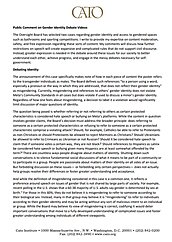The Oversight Board has selected two cases regarding gender identity and access to gendered spaces such as bathrooms and sporting competitions. I write to provide my expertise on content moderation, safety, and free expression regarding these sorts of content. My comments will discuss how further restrictions on speech will create expansive and complicated rules that do not support civil discourse. Instead, greater expression is needed in the debate around these issues for our society to better understand each other, achieve progress, and engage in the messy debates necessary for self-government.
Debating Identity
The announcement of this case specifically makes note of how in each piece of content the poster refers to the transgender individuals as males. The Board defines such references “to a person using a word, especially a pronoun or the way in which they are addressed, that does not reflect their gender identity” as misgendering. Currently, misgendering and references to others’ gender identity does not violate Meta’s Community Standards in all cases but does violate if used to discuss a minor’s gender identity. Regardless of how one feels about misgendering, a decision to label it a violation would significantly limit discussion of major questions of identity.
The question being posed is whether referring or not referring to others as certain protected characteristics is considered hate speech or bullying on Meta’s platforms. While the content in question involves gender claims, the Board’s decision must address the broader principle: does referring to someone as a certain protected characteristics or refusing to refer to someone as a certain protected characteristic comprise a violating attack? Should, for example, Catholics be able to refer to Protestants as non-Christians or should Protestants be allowed to reject Mormons as Christians? Should Ukrainians be allowed to refer to Crimeans as Ukrainian or not Russian? Should it be considered hate speech to claim that if someone votes a certain way, they are not black?i Should references to Hispanics as Latinx be considered hate speech or bullying given many Hispanics are at least somewhat offended by the term?ii There are countless ways people disagree about matters of identity. Shutting down such conversations is to silence fundamental social discussions of what it means to be part of a community or to participate in a group. People are passionate about matters of their identity on all sides of an issue. But forbidding discussion on these issues— or forbidding only certain perspectives— does not actually help groups resolve their differences or foster greater understanding and acceptance.

This work is licensed under a Creative Commons Attribution-NonCommercial-ShareAlike 4.0 International License.

